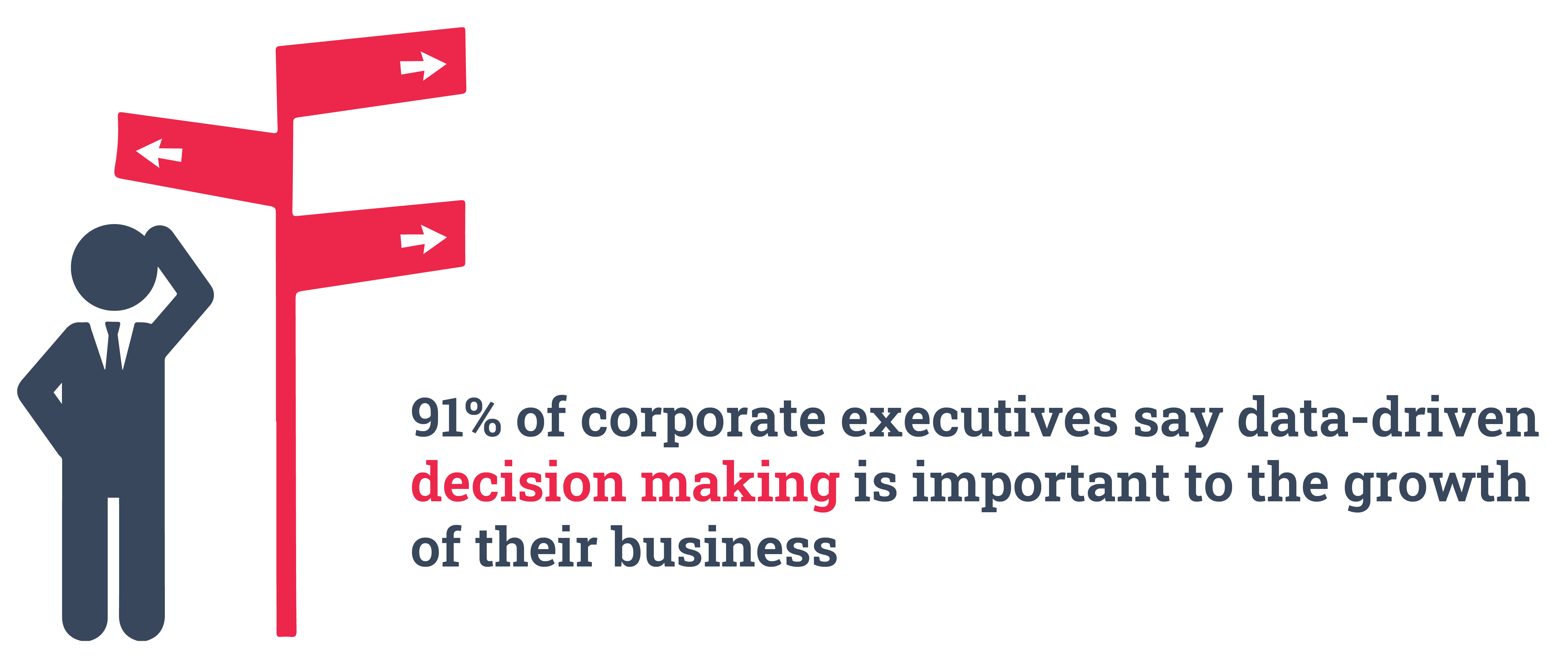Business Intelligence: Benefits and Challenges
Business intelligence (BI) solutions turn data into insights, and insights into actions, all to improve your business. That’s it in a nutshell, really, but if you want to delve a little deeper, which we recommend you do if you’re thinking about investing in BI, then read on.
This blog will cover all the good stuff that investing in BI can bring to your business and discuss the challenges you may face when implementing BI within your organisation. But first, let’s define business intelligence, what BI means and how the BI process works.
Source: TechJury
Business intelligence is a form of descriptive analytics that takes historical or real-time data from an organisation, processes it and presents the results in visual reports. The high-level goal of business intelligence is to find out what happened, why it happened, and what should be done differently to achieve strategic business goals.
Businesses intelligence results are intended to be distributed within an organisation to share findings across departments, and as such, the reports were traditionally static and often printed to be shared. As technology has advanced, reporting capabilities have moved forward, and while reports are still a feature of BI, dashboards and online interfaces have become increasingly popular. BI dashboards offer a more visual and interactive experience that aids creative thinking and decision making.
Business Intelligence combines three core concepts:
- Data analysis - Extraction, Integration & Interpretation
- Data visualisation - Graphs, Charts & Diagrams
- Reporting capabilities - Dashboards, Trends & Performance
The process carried out by business intelligence solutions sees data extracted from its original sources, integrated into a storage system or holding area, then transformed into a structure or model that fits the query language. Then, business analysts or other professionals make queries; the results are presented as visualisations on dashboards and reports. The insights generated from this process inform operational decisions and business strategies - ensuring that actual data informs each move a company makes.
The number of organisations utilising BI solutions has ‘accelerated massively’ in the last decade - a trend attributed to several factors, including the advent of cloud computing, which made BI software cheaper, allowing smaller companies to utilise its power. Additionally, advancing accessibility and self-service BI solutions have diversified BI’s use from an analyst-only tool to mass adoption throughout different departments and job roles.
According to FinanceOnline, over 46% of businesses use BI as a core business strategy. BI adoption only increased with the 2020 pandemic as the need for remote access to data insights became an immediate necessity for many organisations.
Key Benefits of Business Intelligence
So, why has business intelligence become so important to organisations today? Let’s take a look at some of the key benefits of business intelligence.
1) Improved decision making

Source: SuperOffice
The ability to track and analyse several KPIs and business metrics using data from multiple sources is a priority for modern organisations. Modern BI accelerates and improves decision making by delivering a comprehensive view of business data and generating visual insights that enhance understanding.
Business intelligence enables advanced performance monitoring at a high level, while also facilitating ad-hoc queries on an individual, returning results in a centralised, highly visualised manner. BI solutions highlight business trends and identify new potential KPIs to track, as well as adding layered data points to KPIs of particular influence. Weighting data points in this way can help businesses understand how certain elements, such as seasonality, ad spend or channel impact KPIs.
2) Increased organisational efficiency & productivity
Source: MicroStrategy
Organisational efficiency is negatively impacted by the need to manually generate data sets to analyse and create static reports. Oftentimes, this data is held within disparate systems without easy accessibility to professionals who require it for reporting. For example, if business data is held in legacy systems that can only be accessed and queried by data analysts, creating a significant lag time between requesting a report and receiving its results. Static reports often do not reflect the real situation as data changes in the lag time between creation and presentation.
In BI, data is processed, analysed and visualised faster and at scale, far exceeding manual capabilities. Modern BI solutions are also more accessible to non-analyst staff members, opening up data and insight access to the greater organisation. This speeds up the rate of report-to-insight sharing and in turn, accelerates the rate of action taken across the organisation.
3) Improved customer experience

Source: Alvaria
Business intelligence can help organisations to understand their target audience better by taking the customer data they have collected, such as user behaviour, previous purchases, customer surveys, etc., and presenting it visually to tell a story about the customer. Data storytelling of this kind can inform future product development, content creation, operational changes, and more.
Arming customer service agents with access to self-service business intelligence greatly improves the customer experience by allowing agents to fulfil the omnichannel expectation of modern consumers. The data presented by BI, enables agents to know everything about a customer’s relationship with the brand in one view, avoiding the customer having to repeat themselves, which they hate.
4) Banished data silos
Data silos commonly exist within organisations, they naturally occur when each department collects and stores data for their own goals and objectives. The data collected is generally not shared between departments, meaning valuable insights fall by the wayside. The problem is exacerbated when multiple technologies and applications are onboarded within departments, isolating customer data by channel, for example, email, social media, push notification, etc. The new tech solves a pain point, but it also creates a new silo within the department itself, making it almost impossible to gain a comprehensive view of your customer behaviour.

Source: Salesforce
Business intelligence aims to integrate all organisation data stores to facilitate cross-channel and cross-departmental data analysis. By using BI capabilities, you can identify shared KPIs and cross-departmental goals that promote collaboration, diminish negative tribalism and competitive in-fighting.
5) Competitive advantage
Modern businesses are in constant competition with one another, often selling the same products and services to a select target audience - finding a factor that differentiates your business from the competition is highly advantageous. Oftentimes, the answer can be hidden away in your organisational data and business intelligence tools have the power to shine a light on it.
Using BI tools, you may be able to stock check your inventory, ensuring less wastage from unnecessary orders. By identifying which products are selling well and which are in decline, you can allocate more budget toward the correct product lines. Or you may identify possible upselling opportunities by monitoring customer purchasing patterns and using this information to guide future product recommendations on your website or app. Business intelligence can also help you to identify the reason for customer churn faster and find a solution to the issue, improving customer loyalty at the same time.

Source: MIT Sloan
Business Intelligence Challenges
As with all organisational transformations, the path toward becoming a data-driven brand is not straightforward and there are a number of potential challenges that you may face along the way.
Let’s take a look at a few of these challenges:
1) Lack of BI strategy
Investing in BI technology without first assessing your business’s performance and processes to find areas where you want to improve, can lead to costly and unsuccessful BI implementation. Benchmarking your organisation and setting goals before you invest ensures that you can prove the effectiveness of your BI project. Without it, you may find a lack of direction and adoption... this leads us to our next point.
2) Company-wide adoption
Some stakeholders or staff members may be apprehensive about incorporating business intelligence into their operations. Low adoption rates can be due to a lack of understanding of how to use BI technology, how to interpret the data or how to translate this data into actions. Many of these challenges can be mitigated by investing in intuitive, self-service BI products that can be aligned with the capabilities of your organisation. Carry out training and set KPIs that are appropriate for each department to ensure adoption success.
3) Data quality
The insights that you garner from your business intelligence is only as good as the data you collect. Poor data quality can lead to poor business performance. Ensure that your data is of high quality by implementing data management standards across your organisation with regards to data cleansing, standardisation, matching, profiling, etc.
The future of business lies within data-driven operations; right now, a huge amount of businesses are collecting data and storing it. But, they’re falling flat when it comes to interpreting and actioning insights from that data.
Business intelligence has the potential to grow your business with the power of analytics. Work faster, smarter and happier by leveraging business intelligence today.
Share this
You May Also Like
These Related Stories

What is Business Intelligence?

[Infographic] Benefits of Business Intelligence




